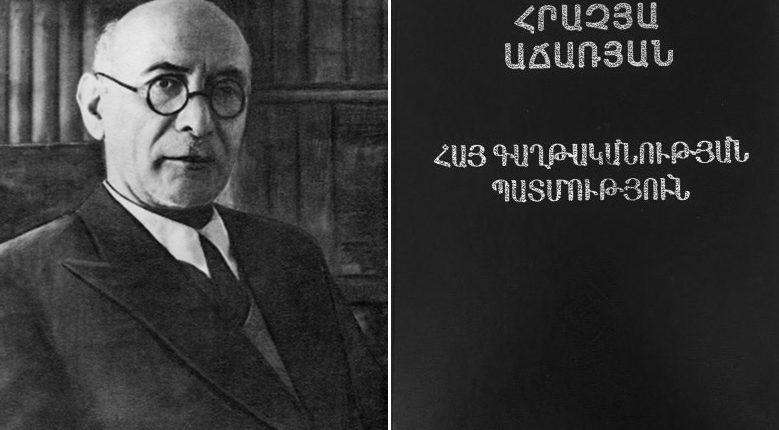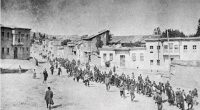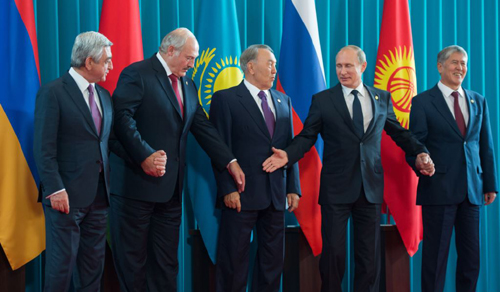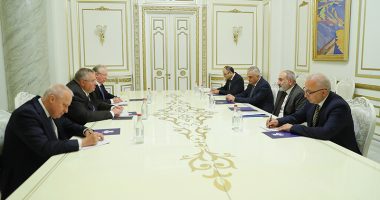“Armenian Etymological Dictionary” In View of Today’s National Anxiety
BY FR. ZAVEN ARZOUMANIAN, PhD
Why Recall The Great Linguist?
We should recall the greatest Armenian linguist Prof. Hrachia Ajarrian in view of today’s uneasiness and anxiety regarding the seriously endangered Armenian language both in Armenia and abroad, where the Eastern and Western sister dialects are under severe damage right from their foundations. Irresponsible steps taken occasionally have closed Armenian schools and drastically demoted language instructors especially in the Diaspora, let alone the Eastern dialect that suffered deeply under the Soviet regime. Recently regretfully even after the collapse of the system, and ironically under the independent Armenian Republic the language is intolerably falling apart. Most carelessly and catastrophically the regress in Armenia is contributing to the deterioration of the pure Armenian vocabulary and the vivid style which the Eastern dialect enjoyed before the Soviet occupation. The pure Eastern Armenian in our homeland is now unrecognizable, as simultaneously the Western dialect abroad is struggling for survival.
Many scholars have alerted the danger many times, and I think it may even be too late to salvage any part of its glorious past. In reminiscing the famous linguist, Hrachia Ajarrian and his unique “Armenian Etymological Dictionary,” the least we can do is to recall the linguistic roots of our language one more time and feel somewhat comforted on the surface. He was the great scholar who dismissed all and any political consideration courageously and academically, and wrote the introductory 40 pages in pure Armenian and in classical orthography, not a single word deteriorated, as he did through the entire pages of his four-volume Dictionary with thousands of Armenian words and their derivatives. The Dictionary was first printed in 1926 in a glazed format, and later in four impressive volumes by the State University of Yerevan in 1974.
His Life
Even though Hrachia Ajarrian was born in Constantinople in 1876, he lived his entire life in Armenia and dedicated himself to the homeland and to the complete study of the Armenian language, after graduating both from Sorbonne (Paris) and Strasbourg (Germany) universities, specializing in linguistics, under famous scholars of the Armenian language Antoine Meillet and Heinrich Hubsch-Mann, who invited Ajarrian to deliver papers at their universities.
Subsequently, he was invited in 1898 by Catholicos Mkrtich I Khrimian of Holy Etchmiadzin to teach at the Kevorkian Seminary, where he published his first epoch-making study “Classification des dialects armeniens” in French. He was among the very few scholars who upon return from Europe founded the State University of Yerevan one hundred years ago, as early as 1921, the year the Republic of Armenia was annexed to the Soviet Union. Ajarrian lived all his life in Armenia as a lecturer in the State University and the Kevorkian Seminary, publishing monumental volumes on the Armenian language and its origins next to his “Etymological Dictionary,” among them his famous “Dictionary of Armenian Proper Names”. He passed away in 1953.
The Etymological Dictionary
The “Etymological Dictionary,” unique in its kind, has gained international recognition. It deals with all Armenian words from the antiquity, selected from all Armenian historiography from the 5th to the 17th centuries, evaluating each according to their origins and derivatives. As he explains in his 40-page in-depth Introduction, written purely in classical style and orthography, six divisions were needed to accomplish the etymology: the knowledge of the words individually regarding to the roots of each, their declensions, meanings, citations, derivatives, and the variants “as the most fundamental and important parts,” as he states.
In his specialty, Ajarrian has excelled all previous Armenian linguists, being able to collect all the vocabulary scientifically, historically, and academically concurrent with the rules of the sounds of each word. His conclusive work included 5062 Armenian words in total, including gradually developed words from the provinces. Taking all the above into consideration the author of the Dictionary has grouped the words according to their historic origins, whether local or borrowed, the former from the original Indo-European aboriginal language, and the latter “borrowed from the Iranian language, old and new, from the Assyrian, the Khaldian, the Georgian, and the Latin languages”.
Above all Ajarrian has created four groupings of the Armenian words, identifying them as “created by the people, the self-sounding words, the unspecified ones, and those deformed handwritten words, all of them discovered in ancient manuscripts.” He has credited our medieval historians with the know-ledge of etymology, since “most of their vocabulary is scientifically evidenced.” A prime sample in my opinion is the 5th century theologian and philosopher Eznik of Kolb, one of the leading translators of the Bible under Sts. Sahag and Mesrob, who wrote his book on the “Refutation of Sects.”
Conclusion
The “Etymological Dictionary” is truly an encyclopedia of the Armenian language that expounds in many directions each word from its origin, history, and application, with gradual growth and influence, paralleled with the culture of the Armenian people in general. It also helps to understand the interaction of other neighboring languages in terms of “borrowing” and “influencing”. As stated by Prof. Hrachia Ajarrian’s student Edik Aghayan, “It is impossible to figure any etymological study, Armenian or otherwise, without having at hand the wealth of this monumental Dictionary.”










